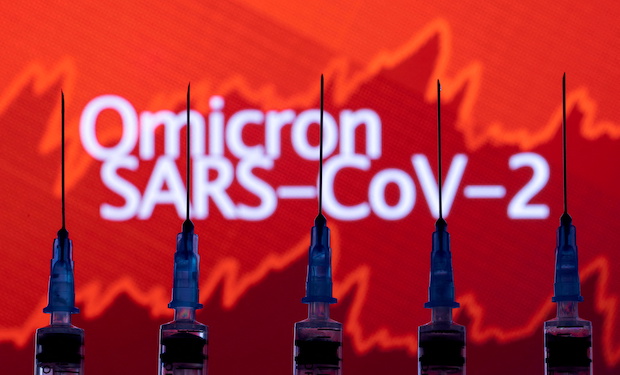
(REUTERS/Dado Ruvic/Illustration)
All indicators being monitored by the government to assess the COVID-19 situation show that the worst of the Omicron surge may be over for the country.
Asked in an interview with radio station dzBB on Thursday if the crisis was or nearly over, Health Secretary Francisco Duque III said: “Nalagpasan na natin kasi low risk na tayo (We’ve hurdled it as we are now at low risk).”
Aside from the continued decline in the number of new infections, Duque cited nationwide figures that suggested an improvement in the pandemic situation, including the two-week growth rate, average daily attack rate (Adar) and health-care utilization.
He said the country’s two-week growth rate was currently at negative 81 percent, while the Adar—or the average number of new cases during a period out of every 100,000 individuals—was at seven, which is considered “low risk.”
The country’s health-care capacity, he added, was also at low risk at a little over 30-percent utilization.
“This means that three out of 10 COVID-19 beds have been occupied, that’s low… so we will not just look at the cases, you zero in on the health systems capacity, that is what we have to monitor and focus on,” he said.
Duque added that it must be ensured that health-care utilization would not be overwhelmed and this could be done through vaccination to prevent people from getting severely or critically ill.
However, the third national vaccination drive of the Department of Health (DOH) continued to move at a slow pace and might not reach its final target of inoculating five million people, according to Undersecretary Myrna Cabotaje.
“It’s a bit slow. We are reaching about 2.6 million only, when there are only two days left… We need to be faster,” Cabotaje said at the Laging Handa briefing on Thursday.
The government wants to ramp up its vaccination drive to pave the way for the Philippines’ transition to the new normal.
As of Feb 16, some 61.9 million individuals, or just more than half of the population, have been fully vaccinated, while 9.3 million have received their booster shot.
Kids’ vaccination
But while the national vaccination drive has been floundering, the DOH has been happy with how the pediatric vaccination was turning out with 263,932 children age 5 to 11 having received their first dose of the COVID-19 vaccine as of Feb. 16, according to Cabotaje.
“In our assessment, the turnout for the vaccination of the 5 to 11 year old [children] has been good and lively,” she said.
Only eight nonserious adverse events and no serious side effects have been reported, she said.
The vaccination of 5- to 11- year-old children was rolled out nationwide on Feb. 14.
On Thursday, the DOH reported 2,196 new infections compared with Wednesday’s 2,671.
The DOH case bulletin showed that the National Capital Region (NCR) topped the regions with the most number of cases with 358, down from the previous day’s 622.
Independent pandemic monitor OCTA Research fellow Guido David said in a post on Twitter that the more than 600 infections in the NCR on Wednesday “feels like a Valentine spike.”
But Duque said it was still too early to say so, noting that it would take a week or two to determine if Valentine’s Day caused a spike in COVID-19 infections.
He added that the DOH has yet to observe a surge in COVID-19 cases since the start of the campaign period.
Campaign restrictions
“It appears that it is not causing a spike in cases since we are still seeing a downward trend,” said Duque. “We believe the vaccine is really a game changer. Many people have already been vaccinated so the virus cannot easily be transmitted.”
Still, Duque said he was not in favor of easing in-person campaign restrictions as he reminded political candidates to remain cautious amid the continuing threat of COVID-19.
Duque said candidates must consider the threat of COVID-19 when conducting campaign sorties instead of urging the Commission on Elections (Comelec) to relax restrictions on in-person campaigning.
“The candidates themselves are the ones who can gauge it… it’s not only their supporters who are at risk, they themselves are at risk. If you remove your mask and shake hands or hug people, do you really want to do those things?” he said.
“Just wear mask. As much as possible do not stay too close to each other,” he added.
The Comelec earlier said that it might review its in-person campaign restrictions due to complaints from several candidates.
These include the ban on handshakes, selfies and any close physical contact between the candidates and voters during campaign sorties.
Duque also reminded the public to consider their safety as they learn to live with the virus.
The health chief reiterated that he was not in favor of the lifting of the mandatory face mask policy anytime soon.
Duque stressed that apart from giving protection against COVID-19, the wearing of masks has been effective in protecting people against airborne transmission of other infectious diseases such as influenza, tuberculosis and measles, among others.